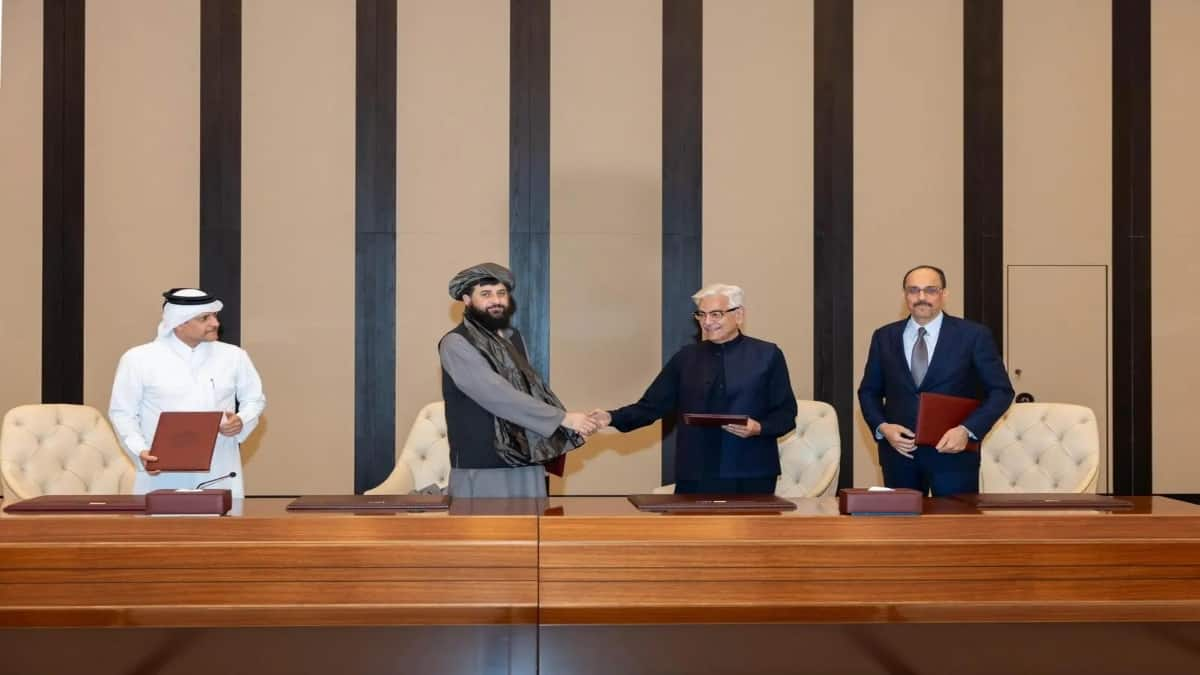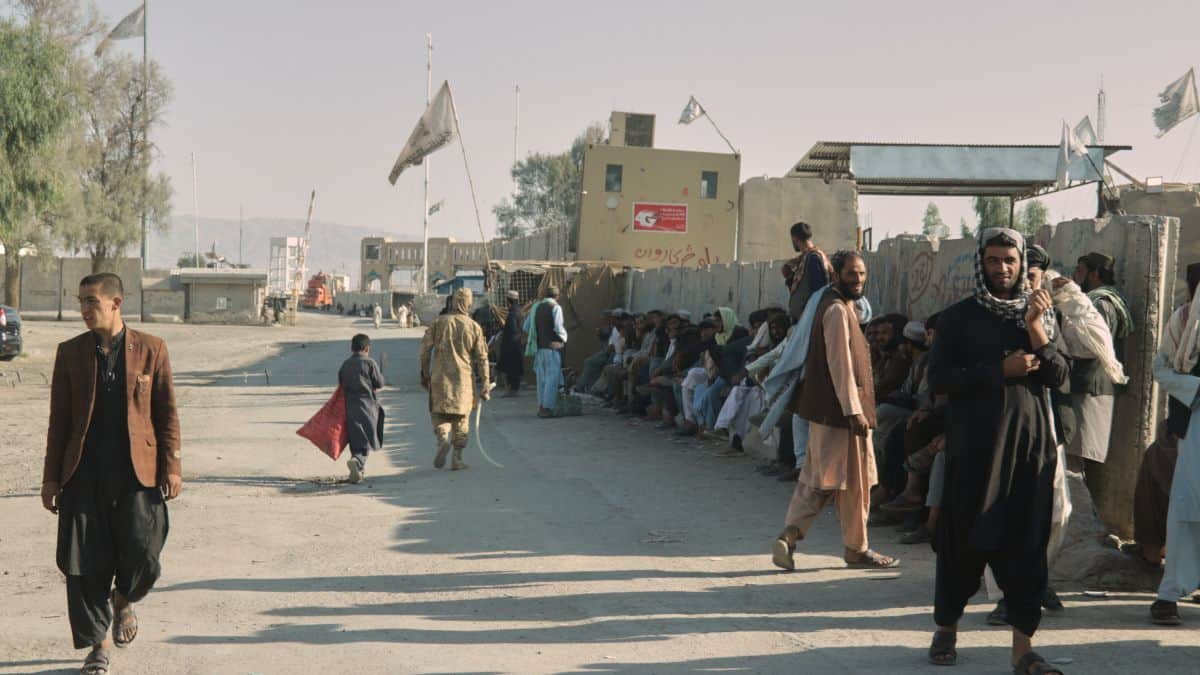What is the story about?
Efforts to ease border tensions between Afghanistan and Pakistan have once again reached a stalemate, with the latest round of talks in Istanbul ending without a breakthrough.
The discussions, facilitated by Turkey and Qatar, were intended to reinforce a fragile ceasefire and establish a foundation for long-term de-escalation.
The failure of these talks comes at a time when relations between the two countries are increasingly fraught.
Since the Taliban’s return to power in Afghanistan in 2021, Pakistan has experienced a surge in attacks attributed to the Tehreek-e-Taliban Pakistan (TTP), prompting Islamabad to accuse Kabul of allowing militant safe havens.
Afghanistan’s leadership denies this, insisting that its territory is not being used to threaten any neighbouring state. As violence escalated along their shared border in recent weeks, the stakes surrounding the peace negotiations had risen significantly.
The Istanbul negotiations followed a period of intense exchanges along the frontier. Fighting in October resulted in dozens of deaths, involving both soldiers and civilians on either side. These clashes were tied to a chain reaction of accusations and retaliatory strikes.
On October 9, explosions in Kabul caused casualties, and Afghanistan’s Taliban authorities claimed they were the result of Pakistani drone operations. They vowed to respond and defended their right to retaliate against violations of their sovereignty.
Pakistan denied carrying out such strikes, but tensions escalated rapidly. Both sides engaged in cross-border attacks in the days that followed.
The growing violence prompted Qatar to step in as a mediator. Representatives from both countries met in Doha, where they agreed to halt hostilities beginning on October 19.

Although the ceasefire reduced immediate fighting, it remained highly vulnerable, with both governments accusing the other of provocation and aggressive posturing.
While the ceasefire technically remains intact, isolated flare-ups continued, even during the Istanbul talks.
Afghan authorities reported that four civilians were killed and others injured in recent cross-border fire. With trust already low, such incidents contributed to the breakdown in negotiations.
The talks in Istanbul were considered one of the most serious attempts at diplomatic engagement since 2021. They were also the third round of negotiations between the two sides in recent weeks.
Mediators hoped to build on earlier discussions in Doha and in a prior meeting in Istanbul at the end of October, which resulted in short-term commitments to maintain calm.
However, progress proved elusive. Delegates clashed on fundamental security expectations, particularly Pakistan’s demand that Afghanistan prevent militant attacks originating from Afghan soil.
During a press conference in Kandahar, Taliban spokesperson Zabihullah Mujahid blamed Pakistan for the collapse of the dialogue, saying that “Pakistan’s demands in the negotiations were unreasonable and the talks could not proceed, the meeting ended and the talks are at a standstill for now.”
He stated that Afghanistan seeks stability, “(we) do not want insecurity in the region, and entering into war is not our first choice,” but added that “if war breaks out, we have the right to defend ourselves.”
Pakistan’s Defence Minister Khawaja Asif offered a sharply different account. He confirmed that the discussions had ended without agreement, stating on Geo News that the “talks are over” and that the Pakistani delegation was returning with “no plan for any future meetings.”
He made clear that Pakistan was not willing to accept verbal guarantees alone, saying, “They said they would respect a verbal agreement, but there is no room for that.”
The issue of documentation became a critical sticking point. Asif said mediators had attempted to persuade both sides to compromise, but these efforts ultimately stalled.
According to him, the Afghan side “was unwilling to sign a written accord,” even though the two parties had verbally acknowledged certain points of understanding.
“There is a complete deadlock. The negotiations have entered an indefinite phase,” he said.
At the centre of Pakistan’s demands is the expectation that Afghanistan will act against the TTP.
Islamabad blames the group for numerous recent attacks inside Pakistan and maintains that its leadership operates from Afghan territory.
The TTP has ideological ties to the Afghan Taliban, though Afghanistan’s ruling authorities repeatedly state they do not control or guide the organization.
Pakistan insists that Afghanistan must demonstrate concrete steps to prevent cross-border militant activity.
On the other hand, Afghanistan’s leaders argue that Pakistan’s internal security issues cannot be laid at their feet and that Islamabad must address its own internal governance and counterterrorism challenges.
Zabihullah Mujahid has reiterated that Afghanistan would not allow its territory to be exploited for attacks on another nation, saying in a statement that Afghanistan “will not allow anyone to use its territory against another country, nor permit actions that undermine its sovereignty or security.”
However, he also asserted that the TTP’s origins and operations were not a product of the Taliban takeover in 2021.
Pakistani officials remain unconvinced.
Islamabad maintains that attacks carried out inside Pakistan are organised from across the border and expects Kabul to impose tighter control. Pakistan’s government has simultaneously carried out airstrikes and undertaken internal security operations targeting suspected militants.
Afghan officials have disputed Pakistan’s claims, saying that civilians have been harmed and denying that such operations achieve their stated purpose.
Both governments say that the ceasefire agreed in Doha has not been formally broken.
While publicly affirming the truce, Pakistan has taken numerous measures that indicate eroding trust. Most notably, Pakistan has kept its major border crossings with Afghanistan closed since October 12.
Only limited crossings have occurred, mainly to allow stranded Afghan nationals to return home.

The restrictions have disrupted a key trade route linking Afghanistan with South Asia and beyond. Hundreds of cargo vehicles remain unable to cross, causing economic strain on both sides.
In addition, Pakistan has continued its campaign targeting undocumented migrants, most of whom are Afghan nationals who sought refuge during decades of conflict.
More than a million Afghans have been repatriated since 2023, according to Pakistani authorities. This policy has strained public sentiment and humanitarian conditions, particularly as Afghanistan is grappling with economic challenges and resource shortages.
The mediators, Turkey and Qatar, invested significant political capital in facilitating the discussions, aiming to prevent renewed armed confrontation between the two neighbours.
While both governments expressed appreciation for the diplomatic efforts, neither side has indicated when or if talks will resume.
Asif noted that the mediators’ optimism had faded, “If they still had optimism, they would have asked us to continue. Our return empty-handed shows that even they have given up on Kabul.”
In contrast, Afghanistan’s representatives suggested that Pakistan’s negotiating posture itself obstructed progress.
The contact between the two nations is now largely limited to maintaining and monitoring the ceasefire.
The bilateral disagreement over who holds responsibility for addressing cross-border militancy remains unresolved, and without movement on this issue, the prospects for diplomacy appear fragile.
There is currently no scheduled fourth round of talks.
Also Watch:
With inputs from agencies
The discussions, facilitated by Turkey and Qatar, were intended to reinforce a fragile ceasefire and establish a foundation for long-term de-escalation.
The failure of these talks comes at a time when relations between the two countries are increasingly fraught.
Since the Taliban’s return to power in Afghanistan in 2021, Pakistan has experienced a surge in attacks attributed to the Tehreek-e-Taliban Pakistan (TTP), prompting Islamabad to accuse Kabul of allowing militant safe havens.
Afghanistan’s leadership denies this, insisting that its territory is not being used to threaten any neighbouring state. As violence escalated along their shared border in recent weeks, the stakes surrounding the peace negotiations had risen significantly.
What happened before the talks?
The Istanbul negotiations followed a period of intense exchanges along the frontier. Fighting in October resulted in dozens of deaths, involving both soldiers and civilians on either side. These clashes were tied to a chain reaction of accusations and retaliatory strikes.
On October 9, explosions in Kabul caused casualties, and Afghanistan’s Taliban authorities claimed they were the result of Pakistani drone operations. They vowed to respond and defended their right to retaliate against violations of their sovereignty.
Pakistan denied carrying out such strikes, but tensions escalated rapidly. Both sides engaged in cross-border attacks in the days that followed.
The growing violence prompted Qatar to step in as a mediator. Representatives from both countries met in Doha, where they agreed to halt hostilities beginning on October 19.

Afghan Defence Minister Maulvi Sahib Muhammad Yaqub Mujahid (centre left) shakes hands with his Pakistani counterpart Khawaja Asif after the two sides agreed to a ceasefire on October 19, 2025. in Doha, Qatar. X/@MofaQatar_EN
Although the ceasefire reduced immediate fighting, it remained highly vulnerable, with both governments accusing the other of provocation and aggressive posturing.
While the ceasefire technically remains intact, isolated flare-ups continued, even during the Istanbul talks.
Afghan authorities reported that four civilians were killed and others injured in recent cross-border fire. With trust already low, such incidents contributed to the breakdown in negotiations.
What happened in Istanbul?
The talks in Istanbul were considered one of the most serious attempts at diplomatic engagement since 2021. They were also the third round of negotiations between the two sides in recent weeks.
Mediators hoped to build on earlier discussions in Doha and in a prior meeting in Istanbul at the end of October, which resulted in short-term commitments to maintain calm.
However, progress proved elusive. Delegates clashed on fundamental security expectations, particularly Pakistan’s demand that Afghanistan prevent militant attacks originating from Afghan soil.
During a press conference in Kandahar, Taliban spokesperson Zabihullah Mujahid blamed Pakistan for the collapse of the dialogue, saying that “Pakistan’s demands in the negotiations were unreasonable and the talks could not proceed, the meeting ended and the talks are at a standstill for now.”
He stated that Afghanistan seeks stability, “(we) do not want insecurity in the region, and entering into war is not our first choice,” but added that “if war breaks out, we have the right to defend ourselves.”
Pakistan’s Defence Minister Khawaja Asif offered a sharply different account. He confirmed that the discussions had ended without agreement, stating on Geo News that the “talks are over” and that the Pakistani delegation was returning with “no plan for any future meetings.”
He made clear that Pakistan was not willing to accept verbal guarantees alone, saying, “They said they would respect a verbal agreement, but there is no room for that.”
The issue of documentation became a critical sticking point. Asif said mediators had attempted to persuade both sides to compromise, but these efforts ultimately stalled.
According to him, the Afghan side “was unwilling to sign a written accord,” even though the two parties had verbally acknowledged certain points of understanding.
“There is a complete deadlock. The negotiations have entered an indefinite phase,” he said.
What does Pakistan claim its concern is?
At the centre of Pakistan’s demands is the expectation that Afghanistan will act against the TTP.
Islamabad blames the group for numerous recent attacks inside Pakistan and maintains that its leadership operates from Afghan territory.
The TTP has ideological ties to the Afghan Taliban, though Afghanistan’s ruling authorities repeatedly state they do not control or guide the organization.
Pakistan insists that Afghanistan must demonstrate concrete steps to prevent cross-border militant activity.
On the other hand, Afghanistan’s leaders argue that Pakistan’s internal security issues cannot be laid at their feet and that Islamabad must address its own internal governance and counterterrorism challenges.
Zabihullah Mujahid has reiterated that Afghanistan would not allow its territory to be exploited for attacks on another nation, saying in a statement that Afghanistan “will not allow anyone to use its territory against another country, nor permit actions that undermine its sovereignty or security.”
However, he also asserted that the TTP’s origins and operations were not a product of the Taliban takeover in 2021.
Pakistani officials remain unconvinced.
Islamabad maintains that attacks carried out inside Pakistan are organised from across the border and expects Kabul to impose tighter control. Pakistan’s government has simultaneously carried out airstrikes and undertaken internal security operations targeting suspected militants.
Afghan officials have disputed Pakistan’s claims, saying that civilians have been harmed and denying that such operations achieve their stated purpose.
How is the Afghanistan-Pakistan standoff affecting people on ground?
Both governments say that the ceasefire agreed in Doha has not been formally broken.
While publicly affirming the truce, Pakistan has taken numerous measures that indicate eroding trust. Most notably, Pakistan has kept its major border crossings with Afghanistan closed since October 12.
Only limited crossings have occurred, mainly to allow stranded Afghan nationals to return home.

People wait near the closed gate at the Spin Boldak border crossing with Pakistan, after the border was shut for nearly two weeks following clashes between Afghan and Pakistani forces, in Kandahar province, Afghanistan, October 23, 2025. File Image/AP
The restrictions have disrupted a key trade route linking Afghanistan with South Asia and beyond. Hundreds of cargo vehicles remain unable to cross, causing economic strain on both sides.
In addition, Pakistan has continued its campaign targeting undocumented migrants, most of whom are Afghan nationals who sought refuge during decades of conflict.
More than a million Afghans have been repatriated since 2023, according to Pakistani authorities. This policy has strained public sentiment and humanitarian conditions, particularly as Afghanistan is grappling with economic challenges and resource shortages.
So, what happens now?
The mediators, Turkey and Qatar, invested significant political capital in facilitating the discussions, aiming to prevent renewed armed confrontation between the two neighbours.
While both governments expressed appreciation for the diplomatic efforts, neither side has indicated when or if talks will resume.
Asif noted that the mediators’ optimism had faded, “If they still had optimism, they would have asked us to continue. Our return empty-handed shows that even they have given up on Kabul.”
In contrast, Afghanistan’s representatives suggested that Pakistan’s negotiating posture itself obstructed progress.
The contact between the two nations is now largely limited to maintaining and monitoring the ceasefire.
The bilateral disagreement over who holds responsibility for addressing cross-border militancy remains unresolved, and without movement on this issue, the prospects for diplomacy appear fragile.
There is currently no scheduled fourth round of talks.
Also Watch:
With inputs from agencies






















